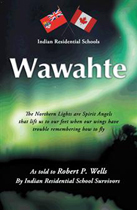"I didn't do anything bad. Papa, why do these people not like me? Papa got a very sad look on his face and looked as if he was trying not to cry."

 |
Wawahte by Robert P. Wells Trafford Publishing
book review by John E. Roper
Racism takes many forms. When it rises from simply being the opinion of a handful of people to becoming widely accepted by a nation, it can result in official programs that may to the public be touted as beneficial, but that can actually discriminate against entire ethnic groups. In his book about Canada's Indian Residential Schools, the author has compiled detailed information along with first-hand accounts of individuals affected by the country's former laws toward its original residents.
The first part chronicles the experiences of Esther, a Cree whose early childhood was spent divided between winter and summer homes with her family and other villagers. Although marked by poverty and devoid of most of the creature comforts of urban dwellers in the time period, Esther's life was a happy one until she, along with 24 other Cree children in her village, were taken from their homes to Pelican Lake Indian Residential School 500 miles away. Once there she suffered mental, physical, and even sexual abuse at the hands of those charged to look after her. Bunnie's experiences were more positive, but the need to be separated from her family still haunted her. A third child, Stephen, was allowed to attend a village day school instead, but many of the same discriminatory practices that Esther faced became a part of his school life, as well.
Wells does a commendable job of bringing to light painful events from history that many might wish to ignore. Well researched and informative, his book is an excellent reminder of how prejudice can affect public policy.